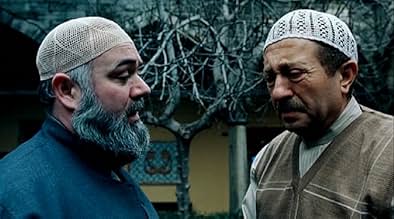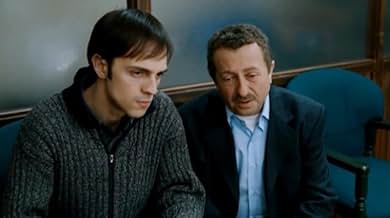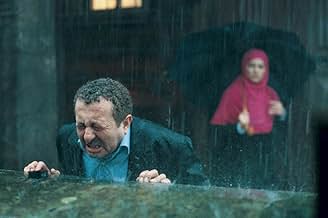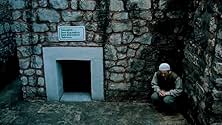Takva
- 2006
- 1h 36min
CALIFICACIÓN DE IMDb
7.4/10
14 k
TU CALIFICACIÓN
Agrega una trama en tu idiomaA promotion brings a Muslim's relationship with God into question.A promotion brings a Muslim's relationship with God into question.A promotion brings a Muslim's relationship with God into question.
- Dirección
- Guionista
- Elenco
- Premios
- 19 premios ganados y 15 nominaciones en total
- Dirección
- Guionista
- Todo el elenco y el equipo
- Producción, taquilla y más en IMDbPro
Opiniones destacadas
Takva - A Man's Fear of God is one of those films that playfully enact conflicts of fundamental importance for the world we live in. Takva starts off with humble Muharrem, an introverted single man living in Istanbul, being drawn into the inner circle of a Muslim brotherhood he has adhered to ever since his childhood days. When the erudite and strikingly pragmatic leader, Sheikh Cemal, appoints him as his financial organizer, Muharrem gets endowed with all the amenities and trappings of a modern world businessman. He has to collect rent and administer the order's finances. His naive will to live a life according to what he thinks is the will of God clashes not only with his unfulfilled sexual desires, but also with the mechanisms of power within the order. The brothers' lifestyle may be conservative, but they run an organization that is fully intertwined with the present day social, political and economic life of Turkey.
For Muharrem, who hardly understands any of this business, this means that every step he intends to make for the greater glory of God draws him ever deeper into the quagmire of corruption, lies and hypocrisy. The authority he is endowed with now makes him haughty and difficult to deal with, while his accumulated frustration increasingly throws him into literal fits. Everything escalates when he comes face to face with the woman he desires...
The plot for this great film is based on an old folk tale from Turkey about a man who refuses to marry the daughter of his spiritual master although he clearly loves her. In Onder Cakar and Omer Kiziltan's adaptation, the narrative serves to expose the inner mechanisms of puritan Muslim orders and throw light on the mental set-up of its loyal members. The film is pure fun to watch due to countless instances of great irony, a remarkable love for detail and breathtaking scenes of ecstatic rituals. While the filmmakers were very careful not to ridicule the milieu they're depicting, their critical approach accounts for a film that substantially helps understand the way political Islam "works".
For Muharrem, who hardly understands any of this business, this means that every step he intends to make for the greater glory of God draws him ever deeper into the quagmire of corruption, lies and hypocrisy. The authority he is endowed with now makes him haughty and difficult to deal with, while his accumulated frustration increasingly throws him into literal fits. Everything escalates when he comes face to face with the woman he desires...
The plot for this great film is based on an old folk tale from Turkey about a man who refuses to marry the daughter of his spiritual master although he clearly loves her. In Onder Cakar and Omer Kiziltan's adaptation, the narrative serves to expose the inner mechanisms of puritan Muslim orders and throw light on the mental set-up of its loyal members. The film is pure fun to watch due to countless instances of great irony, a remarkable love for detail and breathtaking scenes of ecstatic rituals. While the filmmakers were very careful not to ridicule the milieu they're depicting, their critical approach accounts for a film that substantially helps understand the way political Islam "works".
I think it goes much to far to call this excellent film a documentary about the life of a Muslim sect or a critique of political Islam or even the role of the religious orders in Turkish economic life. Rather I would like to claim that it gives just an impression of the life Turkish religious orders, society and the mind of a devout religious man who previously led a uncritical life without real challenges and without deep thoughts about practical life and religion. Therefor he's unprepared for both of it.
I would guess that one could find his "state of mind" also with a range of uncritical believers of many religions who, although ardently believe stay shallow in their intellectual penetration of their believe and worldly life. They stay rather caught in conservative dogmas, which where made to control man and are far away from a healthy human experience.
Not everything shown in Film should be taken at face value. The depiction of the ritual life gives an impression of the ecstatic quality of such gatherings but is exaggerated in their frenetic appearance. There may have been reasons for this depiction but one should rather try not to confuse it with the an authentic account; this account one should rather get in contact with real orders.
The protagonist has high values which he fails to satisfy. This puts him in a moral dilemma which is very instructively set in contrast on one hand to worldly every day people and merchants with their cheating and accommodation with an imperfect world. On the other there is a religious order, which although is directed towards spirituality is of course also involved in worldly enterprises and has of course it financial interests. Nothing gets euphemised but the problems of both - profane and spiritual - get expounded in a way that a psychological profile of shallow but devote believer meets social criticism (not only hitting the Turkish Islamic milieu of its setting but also similar ones in other regions and religions).
I would guess that one could find his "state of mind" also with a range of uncritical believers of many religions who, although ardently believe stay shallow in their intellectual penetration of their believe and worldly life. They stay rather caught in conservative dogmas, which where made to control man and are far away from a healthy human experience.
Not everything shown in Film should be taken at face value. The depiction of the ritual life gives an impression of the ecstatic quality of such gatherings but is exaggerated in their frenetic appearance. There may have been reasons for this depiction but one should rather try not to confuse it with the an authentic account; this account one should rather get in contact with real orders.
The protagonist has high values which he fails to satisfy. This puts him in a moral dilemma which is very instructively set in contrast on one hand to worldly every day people and merchants with their cheating and accommodation with an imperfect world. On the other there is a religious order, which although is directed towards spirituality is of course also involved in worldly enterprises and has of course it financial interests. Nothing gets euphemised but the problems of both - profane and spiritual - get expounded in a way that a psychological profile of shallow but devote believer meets social criticism (not only hitting the Turkish Islamic milieu of its setting but also similar ones in other regions and religions).
10ogsezer
I would like to mention a different side of the movie that sheds light on Sufi or Mevlevi orders in Turkish and Islamic history.
Why Muharrem is selected for this task to perform financial affairs of the order? The answer is related with the stages of knowledge or purity that one has to qualify to become a "Perfect Human Being" or "insan-i kamil" in Turkish. This concept or ideology is rooted with Islamic tradition. Many Sufi or Mevlevi order has this process for their dervishes which may take a lifetime to achieve this goal or even never be able to reach that level of "perfection".
Different than being nun or monk which requires leaving mainstream society and living in the monastery with prayers, last step of this difficult and lengthy process of purifying one's soul from earthly desires, is to be able to return to the real world after so many years lived in contemplation and yet not being disturbed with its appeal to commit sin. I believe in the last few minutes head of the order explains this a little bit. And apparently Muharrem failed to accomplish last stage before achieving "perfection".
Why Muharrem is selected for this task to perform financial affairs of the order? The answer is related with the stages of knowledge or purity that one has to qualify to become a "Perfect Human Being" or "insan-i kamil" in Turkish. This concept or ideology is rooted with Islamic tradition. Many Sufi or Mevlevi order has this process for their dervishes which may take a lifetime to achieve this goal or even never be able to reach that level of "perfection".
Different than being nun or monk which requires leaving mainstream society and living in the monastery with prayers, last step of this difficult and lengthy process of purifying one's soul from earthly desires, is to be able to return to the real world after so many years lived in contemplation and yet not being disturbed with its appeal to commit sin. I believe in the last few minutes head of the order explains this a little bit. And apparently Muharrem failed to accomplish last stage before achieving "perfection".
Takva attempts to achieve two things; It is a philosophical drama, and also a quasi-documentary. Putting the main character in a low-profile religious order, and in a ethical conundrum, the movie makers hit two birds with one reel.
Religious orders and their role in the growing politicization of Islam in Turkey is a sensitive subject. The movie refrains from saying much politically, or the characters do not have lines that can be interpreted in such a manner. However, 'Takva the documentary' speaks volumes.
Takva has good actors such as Erkan Can (the lead), a straightforward but engaging story, and a lot to learn from.
Religious orders and their role in the growing politicization of Islam in Turkey is a sensitive subject. The movie refrains from saying much politically, or the characters do not have lines that can be interpreted in such a manner. However, 'Takva the documentary' speaks volumes.
Takva has good actors such as Erkan Can (the lead), a straightforward but engaging story, and a lot to learn from.
The film is about a devoted man to God and his rise in a Way of Islamic society. The film focuses on an ordinary man's Islamic life to his interference with money affairs and the results of it. The psychological state of the man is analyzed from sociological way as well.
The film is great from two main aspects. The first aspect is Erkan Can's wonderful role play. Enormous acting performance. Just unbelievable. The other great side is, the film is shot at real historical places of Istanbul.
The only weakness of the film is the end part of it. The enormous entrance the psychological and sociological perfectness in the beginning was not given in as good as beginning.
Moreover as a philosopher I would like to comment that this film gives a side of Islamica philosophy both its sociology.
The film is great from two main aspects. The first aspect is Erkan Can's wonderful role play. Enormous acting performance. Just unbelievable. The other great side is, the film is shot at real historical places of Istanbul.
The only weakness of the film is the end part of it. The enormous entrance the psychological and sociological perfectness in the beginning was not given in as good as beginning.
Moreover as a philosopher I would like to comment that this film gives a side of Islamica philosophy both its sociology.
¿Sabías que…?
- TriviaTurkey's Official Submission to the Best Foreign Language Film Category of the 80th Annual Academy Awards (2008).
Selecciones populares
Inicia sesión para calificar y agrega a la lista de videos para obtener recomendaciones personalizadas
- How long is Takva: A Man's Fear of God?Con tecnología de Alexa
Detalles
- Fecha de lanzamiento
- Países de origen
- Sitio oficial
- Idioma
- También se conoce como
- Takva: A Man's Fear of God
- Locaciones de filmación
- Productoras
- Ver más créditos de la compañía en IMDbPro
Taquilla
- Total a nivel mundial
- USD 2,040,826
- Tiempo de ejecución1 hora 36 minutos
- Color
- Mezcla de sonido
- Relación de aspecto
- 1.85 : 1
Contribuir a esta página
Sugiere una edición o agrega el contenido que falta

Principales brechas de datos
By what name was Takva (2006) officially released in Canada in English?
Responda























